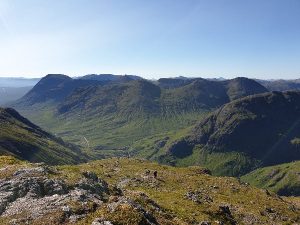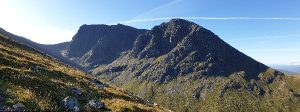| Anglican lectionary: Catholic lectionary: |
1st Reading Ezek 2:1-5 both |
Psalm 123 – |
2nd Reading 2 Cor 12:2-10 both |
Gospel Mark 6:1-13 both |
by Rev Dr Richard Tiplady, Director of Mixed Mode Training, Scottish Episcopal Institute
Take nothing but photos; leave nothing but footprints
A reflection on Mark 6:1-13
 This guideline, beloved of the Scottish mountaineering community and its Munro[1] aficionados, seems particularly apposite as we look ahead to COP26 in Glasgow this coming November. As the first Covid lockdown eased last summer, there was an explosion of ‘dirty camping’ across Scotland as people seized their long-denied freedom and ran off into Scotland’s wilderness areas, leaving old barbeques, food and plastic waste, and even their camping equipment behind after they had finished.
This guideline, beloved of the Scottish mountaineering community and its Munro[1] aficionados, seems particularly apposite as we look ahead to COP26 in Glasgow this coming November. As the first Covid lockdown eased last summer, there was an explosion of ‘dirty camping’ across Scotland as people seized their long-denied freedom and ran off into Scotland’s wilderness areas, leaving old barbeques, food and plastic waste, and even their camping equipment behind after they had finished.
To think about the footprint that we leave upon this earth, whether our carbon footprint or our actual ones, is an act of discipleship. When he sent them out, Jesus instructed the Twelve to travel lightly and live frugally (Mark 6:7-10). The reduce/reuse/recycle mantra is helpful, but the greatest of these is ‘reduce’. Our aspirations for plastic recycling are often thwarted, with much of our plastic rubbish being shipped halfway around the world and lost in landfill there.[2] As we try to ‘Build Back Better’ after Covid, we have the opportunity to make a clean break with our previous patterns of overconsumption. [3]
And for those of us involved in ministry or theological education and who are tempted to search for the splinter in another’s eye before we remove the plank from our own, I would ask you to do one thing. Look at your bookshelves. What will happen to all your precious books after you have gone? They can’t be easily recycled – the glue in the bindings puts paid to that idea. Theological colleges don’t want your old tomes (I know, because we get offered collections by ministers’ widows all the time and we can’t use them). Our new and budding theological students don’t want the books that have sat on your shelves unread for 20 years. Your prized collection of theological books and commentaries, built up over a lifetime, is destined for landfill. Think about that.
To make us feel even more uncomfortable, in the Gospel text for today Jesus seems to link frugality with spiritual authority. Whether it is the story of the widow’s mite, or the contrasting examples of Zacchaeus and the Rich Young Ruler (an early example of the challenge of divestment), Jesus links our spiritual wellbeing to our ability to give things away or to do without them in the first place. “The man who dies rich dies disgraced”. Such was the verdict of Andrew Carnegie (1835-1919), the great Scottish industrialist and philanthropist in his essay The Gospel of Wealth, in which he claimed to “solve the problem of the Rich and the Poor.” He asserted that the only creditable option for those with surplus wealth is to use it during their lifetimes for the common good, and that to do otherwise is a disgrace.
 I started by thinking of the mountains. Mountains are places where one must travel light. Those who are attracted to mountaineering tend to be self-confident and assertive, no-nonsense people of action. And yet mystical and self-transcendent experiences are reported at high altitude by those not normally so inclined. Spiritual experiences are not unusual on mountains. Moses first met with God on a mountain (Exodus 3. 1–6); Jesus delivered his famous sermon on a mountain (Matthew 5–7), and the disciples experienced his Transfiguration on one (Mark 9. 2–8).
I started by thinking of the mountains. Mountains are places where one must travel light. Those who are attracted to mountaineering tend to be self-confident and assertive, no-nonsense people of action. And yet mystical and self-transcendent experiences are reported at high altitude by those not normally so inclined. Spiritual experiences are not unusual on mountains. Moses first met with God on a mountain (Exodus 3. 1–6); Jesus delivered his famous sermon on a mountain (Matthew 5–7), and the disciples experienced his Transfiguration on one (Mark 9. 2–8).
But mountains are not merely places where one might encounter God. They are also places to encounter absence. They are places of denial, of the via negativa. Austere and unaccommodating mountain landscapes point us to the smallness of ourselves. The renunciation or denial of the centrality of oneself points us to something beyond and to something absent. In the traditions of the Desert Fathers, God is met in emptiness and revealed in what others may disregard as a barren nothingness. The Mercy Seat on the Ark of the Covenant was a vacant space. Christ’s victory over sin and death is proclaimed most eloquently by an empty tomb. An indifferent landscape reflects an unfathomable God, one who is far above and indifferent to the petty needs and rivalries that consume us. “One of the scourges of our age is that all our deities are housebroken and eminently companionable”.[4] Our cultural theologies are devoted to self-realization and the fulfilment of our self-potential, and the gods ask only how they can enhance the lives of those they serve. But what mountain wilderness teaches best is abandonment. Its capacity to ignore is immense. Its central spiritual lesson is that it doesn’t care. And yet, in that indifference, one discovers an enormous freedom:
“I come to the mountains not to conquer them but to immerse myself in their incomprehensible immensity — so much bigger than we are — to better comprehend humility and patience, balanced in harmony with the desire to push hard”.[5]
“Plants and animals change as one goes up the mountain, and so, apparently, do people”.[6]
Robert Macfarlane reminds us that “mountains return to us the priceless capacity for wonder”.[7] And wonder helps us to see the presence of God in all things. “If you lose your sense of wonder, you lose the sacramental majesty of the world. Nature is no longer a presence, it is a thing. Your life becomes a dead cage of fact”.[8] As you wander, it would seem, you can find wonder.
The words of Jesus. The needs of our world today. The mountains. All three enjoin us to leave no trace, except perhaps in the lives of others.
The Place That Calls
I am the holy place.
I am the place where calloused feet crack and backs ache.
I am the treacherous place that taunts you and rings with laughter.
And I am the place that calls you back….
I am the scree that unsettles your foothold
And I am the place where plans are hatched
Ideas are matched
And dreams despatched
I am the place and I call you back….
I am the place where you will challenge yourself
and be challenged by others
I am the place to meet new sisters and brothers
I am the throne of petitions and laughter
Of thanksgiving and disaster
I am the house of prayer
I am the horizon
Never seen in towns
I am the end where sky is found
I am the edge-land
That cannot be owned
I am the headwall and the spur
That deride you as you ascend and then
I am the place where god is present
I am the heaven where god is treasured and unfiltered
And unrelenting
And I am the place that calls you back….
I am the cathedral where hope meets doubt
where the sky is reached and earth is found
I am the mountain
And I am your home
Together we are the pilgrims.[9]
by Rev Dr Richard Tiplady, Scotland
[1] There are 282 Munros, which are mountains in Scotland whose summit is more than 3000’ (914.4m) above sea level. With rising sea levels, this number may well reduce!
[2] www.theguardian.com/environment/2019/aug/17/plastic-recycling-myth-what-really-happens-your-rubbish
[3] www.theguardian.com/lifeandstyle/2021/may/30/should-we-all-stop-shopping-how-to-end-overconsumption
[4] Belden Lane (1998), The Solace of Fierce Landscapes:Exploring Desert and Mountain Spirituality, Oxford University Press, p53
[5] Alex Lowe, quoted in Joe Simpson (2003), The Beckoning Silence, Vintage, p58
[6] Diana Kappel-Smith, quoted in Lane, Solace of Fierce Landscapes, p87.
[7] Robert Macfarlane (2003), Mountains of the Mind: A History of a Fascination, Granta Publications
[8] John O’Donohue (1998), Eternal Echoes: Exploring our Hunger to Belong, Bantam Books, p283
[9] Tim Watson @BeatLiturgist and Richard Passmore https://twitter.com/BeatLiturgist
 Erasmus+ – project
Erasmus+ – project